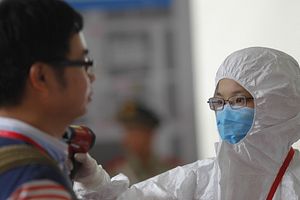The 15th session of the Twelfth National People’s Congress released a draft of its Cybersecurity Law earlier this month (English translation here). Many of the provisions are familiar, but the thrust is clear: censorship will intensify. Article 50, for instance, states “to protect national security and social public order” the government “may take temporary measures regarding network communications in certain regions, such as restricting it.” In other words, the government can shut off the Internet when it wants. This is nothing new, but now it’s (soon to be) official.
And the unforgiving truth is censorship is killing people. The cover-up of industry mismanagement has led to the creation (and shipment overseas) of lethal products. The government works to reduce pollution, but also conceal it, costing lives. Yet the clearest case of how Beijing’s censorship policies are killing people was the SARS coronavirus outbreak that began in Foshan, Guangdong in November 2002. In those crucial early weeks, state media vehemently denied any problem existed, giving the virus time to spread and ultimately kill more people than it would have otherwise.
In a May 2013 science report for Wired, Maryna McKenna tells how a 47-year-old American named Johnny Chen checked into Hôpital Français of Hanoi in February 2003 with a fever and rapidly began to deteriorate. Antivirals didn’t help; his lungs filled with fluid and he began to fade. Chen was put on a ventilator, but the next day he wasn’t any better and now one of the nurses was sick too. One week after he was intubated, 15 hospital staff showed symptoms. Two days later there were 35 infected staff, and two days after that, Chen passed away. The staff at Hôpital Français had heard about an influenza outbreak in Hong Kong and wondered if Chen had contracted his illness there. In other words, they were dealing in rumors. They reached out to the local World Health Organization (WHO), which had already contacted the Chinese Ministry of Health during the Foshan outbreak months before but, McKenna notes, the WHO didn’t know much because the Chinese Ministry of Health had “said there was only a minor outbreak of influenza B.”
The outrageous and willful ignorance of this cover-up not only cost hundreds of Chinese lives but also jeopardized the health of the global community. The virus ultimately claimed 774 lives, including the life of Dr. Carlo Urbani, who had moved to Vietnam to help prevent parasitic diseases in children and who successfully defined the virus before dying of it himself. According to a March 2003 report, “all other countries” that were affected gave “daily updates of cases and deaths to the World Health Organization” while China was “consistently unwilling or unable to provide such information.” This, of course, was because Beijing wanted as few people to panic as possible. Beijing prioritized “public order” over public health because keeping the people calm is what keeps the Party safe–and in its eyes, the Chinese public exists for the Party and not the other way around. However, by deliberately obstructing WHO officials, Beijing endangered all of us. Frank Snowden, professor of history at Yale University, explains:
The world was lucky and dodged a bullet with SARS […] the disease began to spread globally in the spring which, as you know, is normally the beginning of the end of the flu season […] the disease spread to Hong Kong, Singapore and Toronto, and those are all places of highly developed healthcare systems and resources making containment possible. One wonders what the result might have been had the earlier travelers who spread SARS gone to different destinations in resource-poor Third World cities.
Preparedness consists in arming oneself with the greatest quantity and quality of information possible. In this regard, Beijing’s censorship policies not only keep the Party safe, but from time to time, and increasingly as China grows, they put the rest of the world in danger.

































